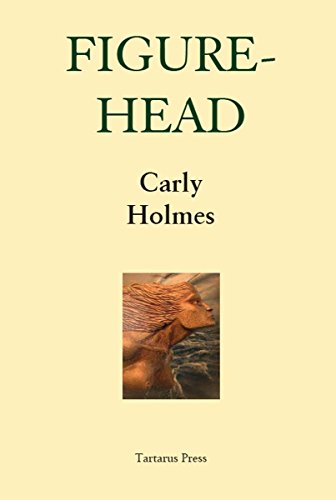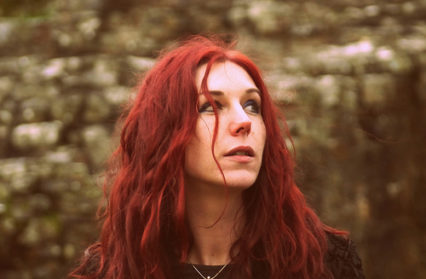Carly Holmes lives and writes on the west coast of Wales. Her debut novel, The Scrapbook (Parthian) was shortlisted for the International Rubery Book Award in 2015, and her award-winning short fiction has appeared in journals such as Ambit, Black Static and The Ghastling, as well as here in Wales Arts Review. Carly’s ‘Literary Strange’ short story collection, Figurehead, was published by Tartarus Press in July, in a collectable, limited edition hardback.
In this interview, she discusses horror writing, the short story form, and the impact her background and upbringing had on making her the writer she is which inspired her to write Figurehead and other projects.
Figurehead (Tartarus Press) is a collection of Literary Horror / Literary Strange short stories, ranging in style from ‘traditional’ ghost stories to peculiar tales that don’t fit easily into any defined genre and ranging in length from novella to flash fiction. There’s even a prose poem in there. Is horror writing becoming broader as a genre?
I think horror writing (which is such a vast and broad genre anyway) and what a reader would view as ‘horrifying’ has always been subjective, and very much subject to the inclinations and tastes of the individual: there’s body horror and psychological horror and folk horror and gothic horror and supernatural horror… I have never defined myself as a horror writer, though I definitely write stories that would be defined as ‘Literary Strange’. Thinking of my favourite writers, with reference to those stories that would be classed as horror, they are all essentially stories about loss, about fear, and about the human condition – Lisey’s Story by Stephen King is at heart a wonderful portrait of a marriage, and IT is about the bonds of friendship and the power of the imagination. The Haunting of Hill House by Shirley Jackson (one of the most terrifying books I have ever read) is really about poor timid Eleanor’s mental disintegration. Hill House, for me, is the physical embodiment of her anxieties and the horror that is her life. Don’t Look Now (Daphne du Maurier) is about a relationship tested and ultimately broken by grief. The horror genre has been given bad press historically by the ‘literary’ writer and reader, it’s seen as a bit pulpy and without real merit, but I think the difference between straight-up ‘genre’ horror and ‘literary’ horror is subtext. A novel about a maniac slashing young virgins then getting blown up is just that; in literary horror, the haunted house or the ghost child often represent something else: the character’s miscarriage or their yearning for a forbidden lover, etc…

A lot of your stories deal with the forming and breaking of relationships: between mother and child, between lovers, between human and non-human characters… was this a deliberate theme for the collection?
I didn’t impose any specific theme on Figurehead (other than the stories all being strange) but nevertheless found myself returning again and again to themes of belonging and banishment, of loss and renewal, particularly between loved ones. In ‘Dropped Stitches’ a mother snips off her daughter’s fingers and sews them onto her own hands, tying them both into a lifetime of identity confusion and identity crisis. In ‘Sleep’ a mother is bound to her damaged, dangerous son by the love she feels for him, but it’s that self-same love that forces her to sever the bond in the most extreme way possible. In ‘Three For A Girl’, the longest story in the collection, the protagonist is haunted by the warring forces of her deep love for her sister and also her desire to have her sister’s life, in every way. In ‘Beneath the Skin’ a woman keeps a monster hungry and half-tame at the bottom of her garden, using it sexually to experience a little of its wildness before returning to the safety of her home. There’s damage in each of the stories, but also instances of great love and loyalty. Often both at the same time.
Your novel, The Scrapbook, had some Gothic/supernatural elements to it but was in essence a story about the power of absence and the dysfunctional relationship between a mother and daughter. Is this move into horror writing something you always intended and plan to stay with?
I’ve never really seen myself as any ‘type’ of the writer, though I’ve always written fiction that is viewed by a lot of people as strange and difficult to categorise. My mother asks me regularly, with exasperation, why must I write such weird stories. That’s not intentional, it’s just me the writer and me the person responding creatively to an image that’s passed through my mind or particular anxiety I’m experiencing, and then burying it deep in fiction. People tell me (I imagine they say the same to every writer) that this or that subject would make a great story, or this or that experience will probably end up in my next novel. None of it ever will, or certainly not in a way I or they will easily recognise. I just don’t write about real life or my life in that way. For example, I’d never write a novel about my time supporting care leavers or working as a refuge worker, I’m naturally drawn to transfiguring my experiences and mining my imagination, exploring the themes that interest or perturb me in ways that aren’t at all naturalistic.
What writers, and particularly horror writers, have influenced you the most to create work such as Figurehead?
My influences are wide and varied: from Stephen King to Elizabeth Jane Howard to Roger Deakin to Dorothy L Sayers to Jon McGregor to Shirley Jackson to Anita Brookner to John Irving to Joyce Carol Oates to Daphne du Maurier to Sarah Waters to Maggie O’Farrell to Anne Enright to Ali Smith to Peter Carey to Robert Browning to Georgette Heyer to the brothers Grimm to Sarah Hall to Julian Barnes to Robert McFarlane… I read all the time; reading is my love and my comfort, regardless of whether I’m writing. I think I’m more drawn to the horror genre because when done well, with a light touch and a lot of depth, it encapsulates those fears we all have: to lose what we love, to be abandoned and unsafe, to be lost and alone with no way back to what we know.
It’s been four years since The Scrapbookwas published. Is the short story form going to be your focus for future writing projects as seen in Figurehead or are there any plans to write another novel?
I was a short story writer before I wrote The Scrapbook so writing short fiction was my first love. Some of my earliest stories were published in Cambrensis and Unhinged (both great, now long dead, magazines) in the late 90s. My aim was always to write a novel but alongside it I continued to write short fiction. They are such different forms and both intense and enjoyable in their own ways. That concentrated immersion I experienced with TheScrapbook was singularly wonderful and it gave me such a feeling of contentment and serenity for the duration of the novel. Short stories are just as immersive but over a much shorter time period so real life doesn’t ever really disappear for me. I inhabit the world of my characters but over a few thousand words (generally less), so it’s easier to pull myself out of their world and re-inhabit my own. My plan now (my plan always) is to write another novel, but also to keep writing the short stuff too.
Animals, or non-human characters, appear regularly in the stories in Figurehead, and often against a landscape of yearning: both for them and to become them. Why is this such a preoccupation of yours?
I’m in love with the natural world and feel more kinship to animals than people on the whole. My anxiety, which gets the better of me more and more these days, is only really soothed by being in my garden, planting a shrub with earth on my hands and a cat or two by my side. Long walks in woodland, preferably alone, are also a wonderful comfort. Stories like ‘Alter’, where the narrator can only watch in disbelief and horror while his girlfriend turns into a badger and leaves him, or ‘A Small Life’, which is essentially about the narrator’s terror of the wildness inside him, the potential to live a life untamed and true to himself, are all subversions of my own longing to connect more with the natural world and less with the human one. The prose poem in this collection, ‘Into the Woods’, is pure wish fulfilment on my part. I’m against anthropomorphising animals and the natural world, against trying to make them fit conveniently into our human landscape with all their ‘unpleasant’ bits smoothed out and covered over. I hate the way humans try to make pets of wild animals as if taming that wildness in them somehow equates to a victory for us, a world made more manageable. It’s a joy to watch the sparrows gossiping and squabbling around the feeder in my garden but it’s also incredible to watch the sparrow hawk plunge from its hiding place in the hawthorn and take one, leaving nothing but feathers and a vast silence in its wake.
What is your writing schedule? Do you have any particular writing routines that have helped with the development of your projects such as Figurehead?
Sadly, I barely write these days. The really difficult thing about freelance editing/proofreading work is the lack of a regular and reliable income and so I spend my time either working, chasing work, or worrying about money. I gave up a career in the social and voluntary sector back in 2010 to do a PhD (I got my MA in Creative Writing in 1998) and give myself a chance with the writing after a decade of creative nothingness (I couldn’t write at all alongside full-time work with Social Services or doing tenancy support, there was nothing left in me at the end of a day) and though I don’t regret the change of career at all I do really hate how financially insecure I am and how anxious that makes me. When I’m writing I’m so at peace in my self, my mind, but I’ve almost forgotten the feeling, and the longer I leave it between spells of writing the easier it is to just fret about it all and not snatch those free days between editing or proofreading assignments.
How has your background contributed to your attraction towards writing strange fiction as opposed to naturalistic and firmly ‘realistic’ fiction?
I was born on the island of Jersey, where generations of my family are from, and I spent the majority of my young childhood on a council estate near Southampton. We were poor and underprivileged, but part of a community of similarly underprivileged people. When we moved to a remote hamlet in rural Wales we were even poorer but suddenly without community, outsiders in a country whose language we couldn’t speak. I was eleven at the time of the move and already a painfully shy and introverted child. I spent my teenage years largely alone, reading in my bedroom with my cat on my lap or wandering the garden with my blind goose. I definitely think the lack of belonging to a community, that outsider status, coming as it did on the cusp of adolescence, has contributed to making me the writer I am. It’s built a fascination for characters who are similarly displaced and without firm, supportive roots, either from a family structure or a wider social community. There’s a lot of loneliness in my writing, a lot of characters either yearning to belong or striving to keep themselves apart.
Figurehead by Carly Holmes is available now.












